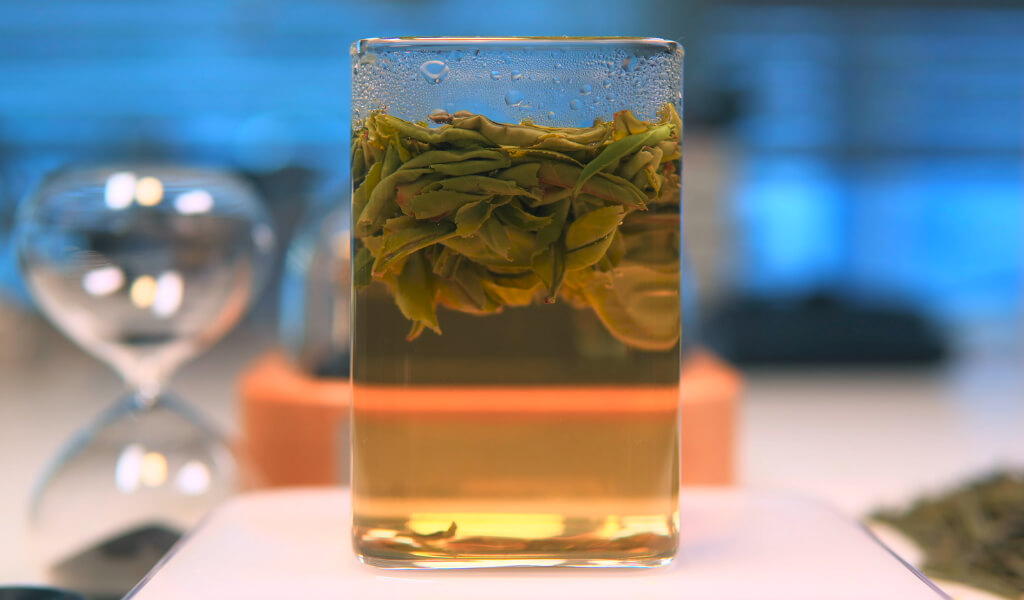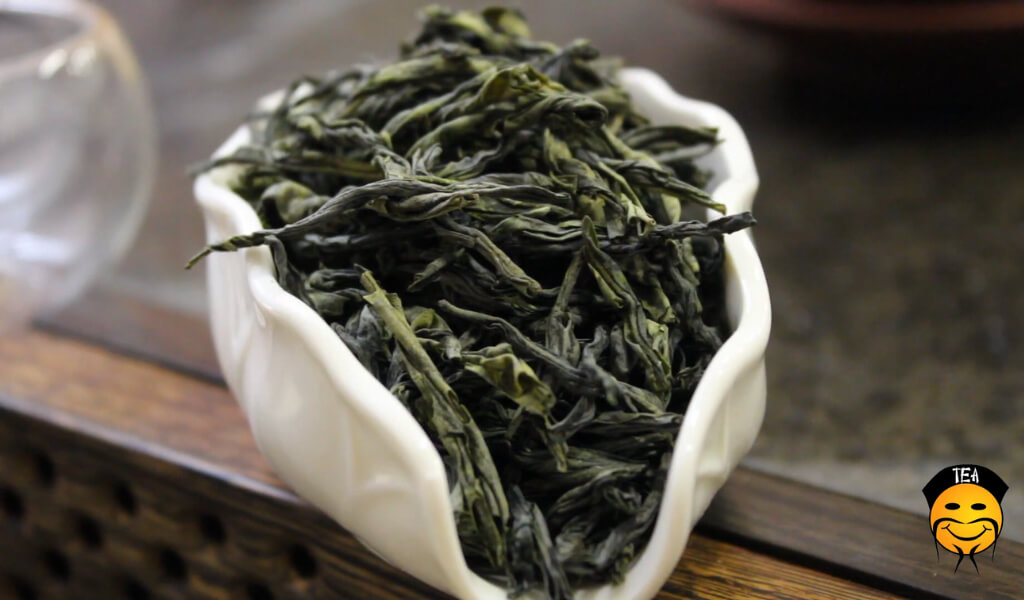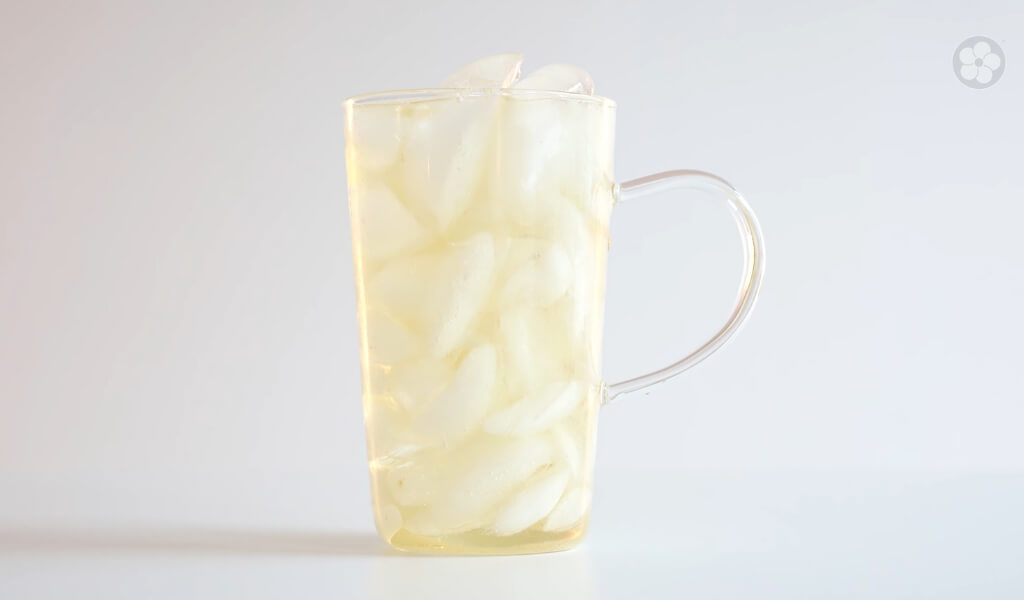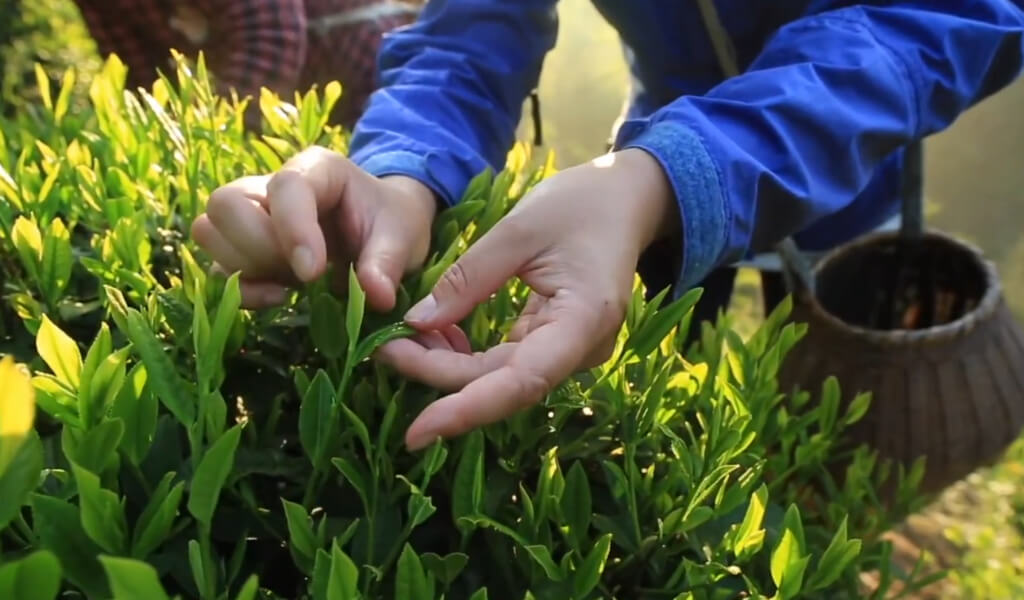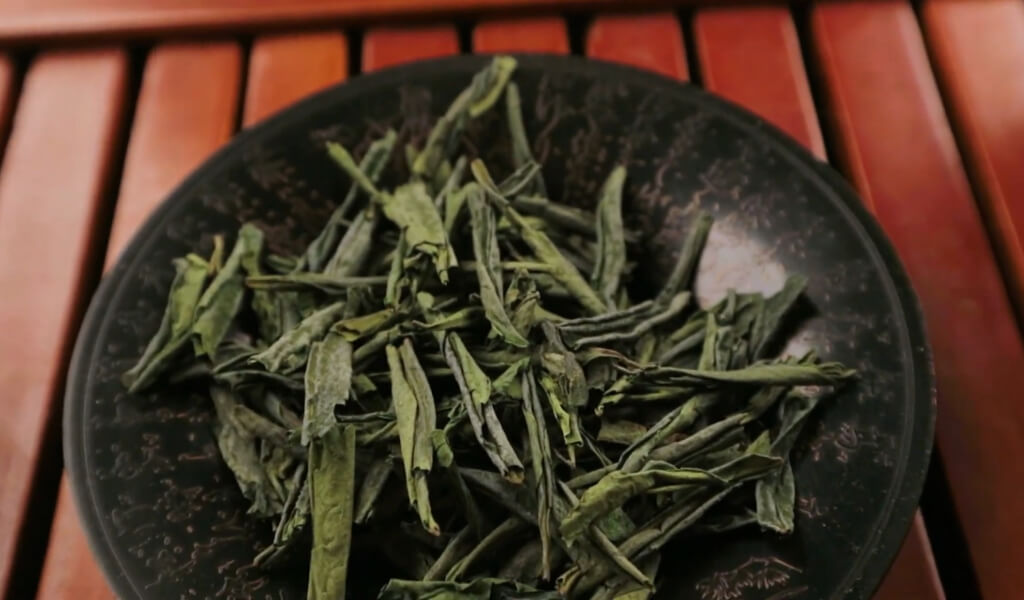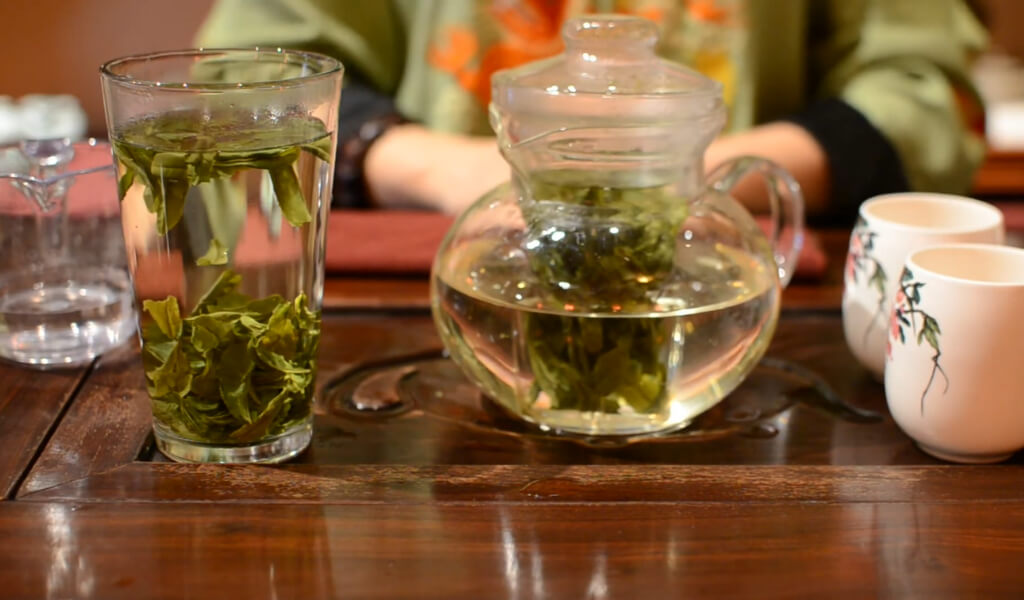The esteemed Lu’An Melon Seed Tea is a signature beverage with a firm position among the top ten renowned teas in China.
Lu’An Melon Seed Tea, or Lu’an Guapian as locally known, carries a distinct appearance that sets it apart in the diverse world of teas. The leaves exhibit a naturally flattened form, curled edges, and a vibrant emerald-green hue. Uniform in size, these leaves resemble sunflower seeds, hence the previous moniker “Guardian”.
What is Lu’An Melon Seed Tea?
Lu’An Melon Seed Tea, or Lu’an Guapian, is a distinctive variety of Green tea originating from China. This remarkable tea, cherished for its unique appearance, elaborate production process, and rich flavour, is one of China’s top ten renowned teas.
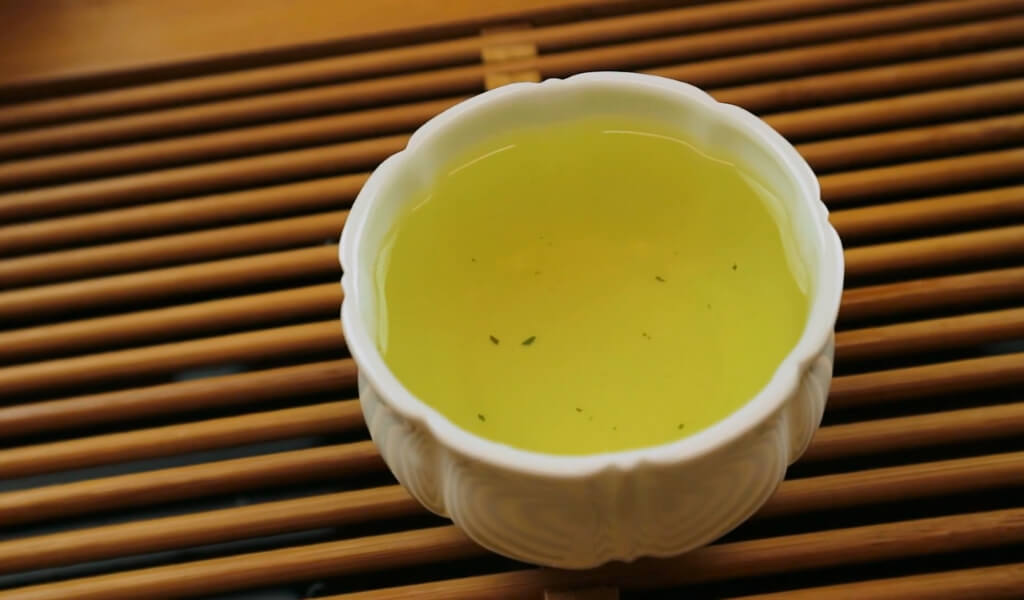
If you’re an enthusiast of tea culture, or someone seeking to discover diverse flavours in the world of teas, Lu’An Melon Seed Tea is a must-try experience!
Origins and History of Lu’An Melon Seed Tea
Tracing its roots back to the Tang Dynasty, Lu’An Melon Seed Tea has a history steeped in rich cultural heritage. This unique tea hails from Lu’An city in the Anhui province, a region known for its lush tea gardens and traditional tea-making practices.
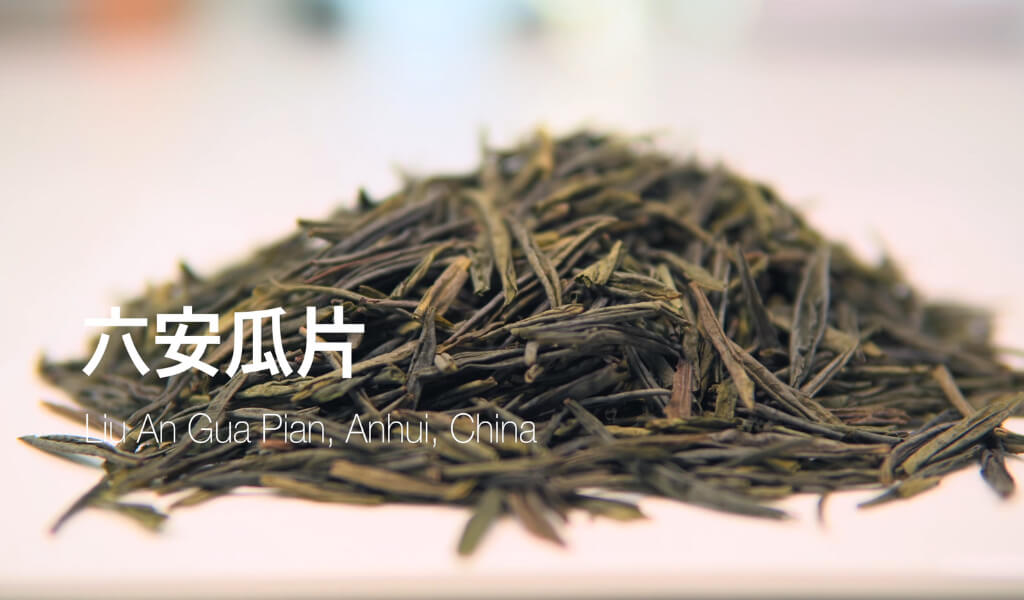
Over centuries, the production techniques of Lu’An Melon Seed Tea have been carefully honed, resulting in the tea’s signature taste and aesthetic.
An old favorite, this tea is often featured in Chinese literature and historical texts, further emphasising its cultural significance.
Uniquely Named for its Appearance
So, why the intriguing name? The answer lies in the distinctive appearance of this tea.
Upon examination, the leaves of Lu’An Melon Seed Tea display a flat, smooth surface that closely resembles melon seeds. The edges exhibit a subtle curl, and the vibrant green hue amplifies this likeness.
This consistent size and shape, resembling sunflower or melon seeds, are the reasons behind the tea’s name. This captivating visual aspect, coupled with its complex flavor profile, has solidified Lu’An Melon Seed Tea’s standing in the international tea industry.
The Harvesting and Production Process
Brewing a cup of Lu’An Melon Seed Tea involves much more than steeping leaves in hot water. The journey from the tea garden to your teacup involves a meticulous harvesting and production process that contributes to this unique tea’s final taste, aroma, and appearance. Let’s delve into this fascinating journey.
Season and Region for Growing
The cultivation of Lu’An Melon Seed Tea is deeply tied to its native region and the rhythms of the seasons. This tea is primarily grown in Lu’An City, located in China’s Anhui province, a region celebrated for its fertile soils and ideal tea-growing climate.
Regarding the time of year, Lu’An Melon Seed Tea is typically picked during the Chinese “Grain Rain” solar term, which occurs from late April to early May. It is during this period that the tea leaves are at their best, packed with the distinctive flavors that define Lu’An Melon Seed Tea.
The Traditional Art of Crafting Lu’An Melon Seed Tea
The production of Lu’An Melon Seed Tea is an art form passed down through generations. Once the leaves are harvested, they undergo several stages to transform into the final product we know and love.
First comes the process of sun-withering, where the freshly plucked leaves are spread out under the sun to wilt and reduce moisture. The leaves are then pan-fired to halt the oxidation process, preserving green tea’s vibrant green colour and fresh flavours.
Next is the shaping stage, where the leaves are flattened, and edges curled, thus earning the resemblance to melon seeds. Lastly, the leaves are baked at a low temperature to reduce moisture and enhance the flavour.
This intricate production process, rooted in tradition and expertise, enhances the allure of Lu’An Melon Seed Tea, making it a staple in the global tea culture.
Read More:
The Unique Characteristics of Lu’An Melon Seed Tea
Lu’An Melon Seed Tea, much like the other revered teas of China, brings to the table its own set of unique characteristics that truly set it apart.
From its unforgettable aroma and flavour to its distinctive visual attributes, let’s delve into what makes this tea special.
Aroma and Flavor Profile
When you brew a cup of Lu’An Melon Seed Tea, you’re greeted with an enchanting, fresh aroma that instantly soothes your senses.
But the sensory experience doesn’t stop there. You’ll notice a unique flavour profile as you take your first sip. This tea is known for its mellow yet rich taste with a slightly sweet aftertaste, offering a perfect balance rarely found in other varieties.
The flavours are robust and linger on the palate, making each sip an experience to savour. The superior quality leaves and the refined production process contribute to this unique sensory journey, making it a top choice for tea connoisseurs.
Read More:
Nutritional
Now, peek at what’s inside a cup of Lu’An Melon Seed Tea. This tea is rich in vital nutrients like vitamins, minerals and powerful antioxidants such as catechins. Moreover, it contains trace amounts of caffeine, less than coffee, making it an excellent choice for those seeking a mild stimulant.
Other beneficial compounds include theanine, an amino acid that promotes relaxation and reduces stress. All these nutritional components work together to provide a healthy and nourishing beverage that’s as tasty as beneficial.
Health Benefits of Lu’An Melon Seed Tea
Boasting potent antioxidant properties, Lu’An Melon Seed Tea plays a crucial role in neutralising harmful free radicals in the body. This protective function safeguards cells from damage and could reduce the risk of chronic diseases.
Improving heart health is another significant benefit associated with Lu’An Melon Seed Tea. Like other green teas, regular consumption could enhance cardiovascular function and lower the risk of heart-related conditions.
Regulating blood sugar levels is also among the potential health benefits of Lu’An Melon Seed Tea. Its consumption could help manage blood glucose, making it a beneficial addition to a balanced diet.
Promoting healthy digestion is another wellness advantage that Lu’An Melon Seed Tea provides. Drinking this tea aids in maintaining a healthy gut, contributing to overall well-being.
Regarding weight management, Lu’An Melon Seed Tea could have a role to play. Its potential to boost metabolism and promote fat burning makes it popular among health enthusiasts.
Enhancing mental health is another benefit attributed to Lu’An Melon Seed Tea. Regular intake could reduce stress and improve mood, promoting overall mental well-being.
Lu’An Melon Seed Tea is a healthful beverage with many potential benefits, but it is not a cure or preventive measure for specific diseases or conditions. Always consult with a healthcare provider for personalised advice.
Read More:
How to Brew the Perfect Cup of Lu’An Melon Seed Tea
Enjoying a cup of Lu’An Melon Seed Tea is an experience, and how it’s brewed can significantly influence its flavour and aroma. Here, I’ll guide you through the brewing process and provide some handy tips for making your tea special.
Step-by-Step Guide
Ingredients:
- 1 teaspoon of Lu’An Melon Seed Tea
- 8 ounces of filtered water
Tools:
- A kettle or pot for boiling water
- A ceramic or glass teapot
- A tea strainer
Steps:
- Start by boiling your water. Lu’An Melon Seed Tea’s optimal temperature should be slightly below boiling, around 80-85°C (176-185°F).
- Add the tea leaves to your teapot.
- Once the water is ready, pour it over the tea leaves in the teapot.
- Allow the tea to steep for around 2-3 minutes. This step is crucial as it allows the tea leaves to unfurl and release their flavours.
Finally, strain the tea into your cup. Enjoy the captivating aroma before savouring your perfectly brewed Lu’An Melon Seed Tea.
Tips and Tricks
While the brewing process is relatively straightforward, there are a few things you can do to elevate your tea experience:
- Quality of tea: Always start with high-quality Lu’An Melon Seed Tea. The quality of the leaves significantly impacts the taste of the final brew.
- Water quality: Using filtered or spring water can enhance the flavour of the tea, as tap water might contain chlorine, which can interfere with the tea’s taste.
- Steeping time: Be mindful of the steeping time. Over-steeping can make the tea taste bitter, while under-steeping might produce a weak flavor.
- Temperature control: Try to maintain the recommended water temperature. Higher temperatures could produce a bitter taste, while lower temperatures might not extract the full flavour.
Enjoy your tea-making journey with Lu’An Melon Seed Tea, and may every cup you brew to bring you joy and relaxation!
Read More:
Storing
When I have some quality Lu’An Melon Seed Tea on my hands, I want to keep it as fresh as possible. Storing tea properly is just as important as brewing it right, and I’m here to share some effective storage practices with you.
Best Practices for Storing Loose Leaf Tea
When I store my loose-leaf Lu’An Melon Seed Tea, I ensure it’s in a cool, dry place away from light, moisture, and strong odours.
I usually use airtight containers, as they help maintain the tea’s freshness by preventing exposure to air. It’s also a good idea to store the tea in a dark cupboard or a tea caddy to shield it from light, which can degrade its quality over time.
Shelf Life of Lu’An Melon Seed Tea and Signs of Deterioration
In terms of shelf life, my experience tells me that Lu’An Melon Seed Tea, when properly stored, can last up to 18 to 24 months. However, I recommend consuming it within a year of purchase for optimal flavour and aroma.
If you notice a loss in flavour, aroma, or the tea leaves have become dull and lost their vibrant green colour, these could be signs that the tea is past its prime.
Read More:
Where to Buy Lu’An Melon Seed Tea
You might wonder where to buy it after learning so much about Lu’An Melon Seed Tea. I can guide you through some reliable options.
Online Marketplaces
In the digital age, you can purchase Lu’An Melon Seed Tea online just like anything else. I recommend checking out reputable tea marketplaces or trusted e-commerce sites like Amazon, and always opt for sellers with high ratings and positive reviews to ensure top-notch quality.
What to Look for When Buying Lu’An Melon Seed Tea
When I shop for Lu’An Melon Seed Tea, I consider several factors.
First, I look at the colour of the tea leaves; they should be vibrant green, signifying freshness. I also check for uniformity in leaf size and shape.
Quality Lu’An Melon Seed Tea leaves have smooth, shiny surfaces without any stems or broken pieces.
And, of course, purchasing from a reputable source is paramount to ensuring you get genuine, high-quality tea.
Read More:
- What is Jasmine Tea? Origin, Tasting, Tea Made & Brewing
- Discover the Different Types of Green Tea: A Comprehensive Guide
In conclusion
Lu’An Melon Seed Tea is an exceptional Chinese tea known for its unique appearance, delicate flavours, and numerous health benefits.
From its origins in Lu’An, China, to its distinctive melon seed-shaped leaves, this top ten famous tea captivates tea lovers worldwide.
Whether savoring its mellow taste, exploring its healthful properties, or perfecting the art of brewing, Lu’An Melon Seed Tea is a treasure to be cherished.
Share this valuable information with others and embark on your journey with this exceptional tea.
Thank you for joining me in exploring the world of Lu’An Melon Seed Tea!
FAQs
What are some tips for enhancing the flavour of Lu’An Melon Seed Tea?
Enhancing the flavour of Lu’An Melon Seed Tea can be achieved by using high-quality tea leaves, and filtered water, controlling the steeping time, and maintaining the recommended water temperature during brewing.
Can I add milk or sugar to Lu’An Melon Seed Tea?
Lu’An Melon Seed Tea is traditionally enjoyed without additives to appreciate its natural taste. However, personal preferences may vary, and you could add a small amount of sweetener if desired.
Does Lu’An Melon Seed Tea have any side effects?
Like all green teas, excessive Lu’An Melon Seed Tea consumption could lead to caffeine-related side effects like restlessness or insomnia. If you have a sensitive stomach, consuming it after meals is betters Lu’An Melon Seed Tea suitable for vegetarians and vegans?
I’m Shanna, creator of Spiritea Drinks. I’m all about teaching people to grow their own food, tea, cook what they harvest, and eat with the seasons.

